Shourya Bose
From RNNs to Foundation Models: An Empirical Study on Commercial Building Energy Consumption
Nov 21, 2024
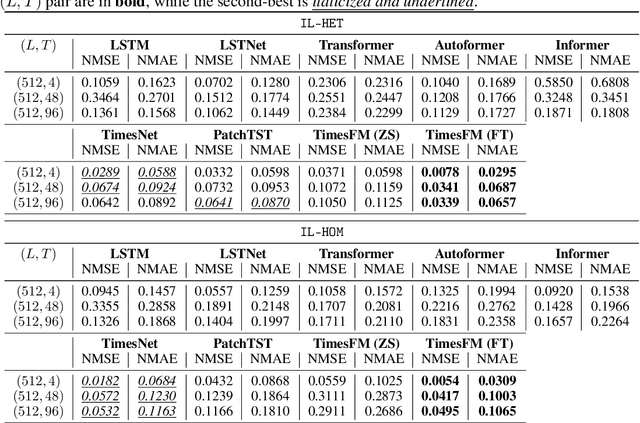


Abstract:Accurate short-term energy consumption forecasting for commercial buildings is crucial for smart grid operations. While smart meters and deep learning models enable forecasting using past data from multiple buildings, data heterogeneity from diverse buildings can reduce model performance. The impact of increasing dataset heterogeneity in time series forecasting, while keeping size and model constant, is understudied. We tackle this issue using the ComStock dataset, which provides synthetic energy consumption data for U.S. commercial buildings. Two curated subsets, identical in size and region but differing in building type diversity, are used to assess the performance of various time series forecasting models, including fine-tuned open-source foundation models (FMs). The results show that dataset heterogeneity and model architecture have a greater impact on post-training forecasting performance than the parameter count. Moreover, despite the higher computational cost, fine-tuned FMs demonstrate competitive performance compared to base models trained from scratch.
Addressing Heterogeneity in Federated Load Forecasting with Personalization Layers
Apr 01, 2024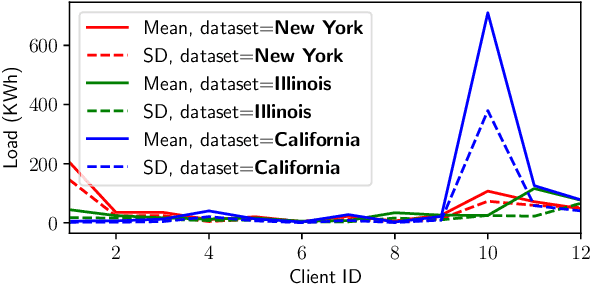
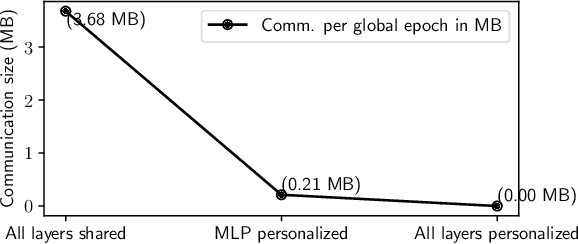
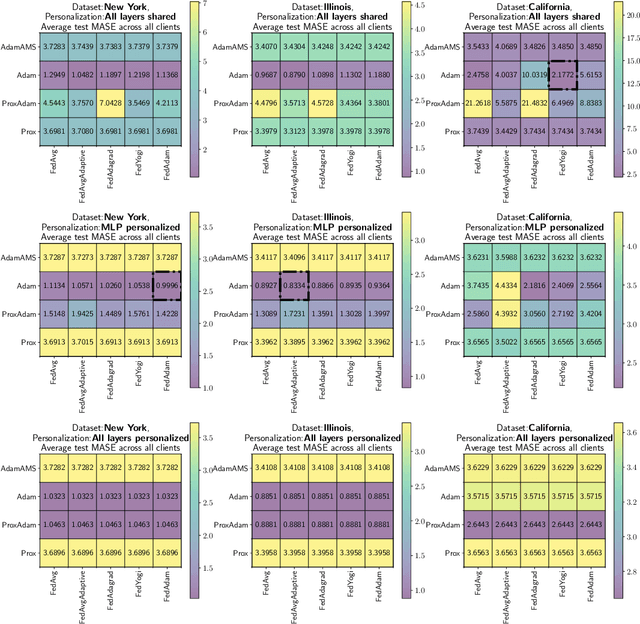
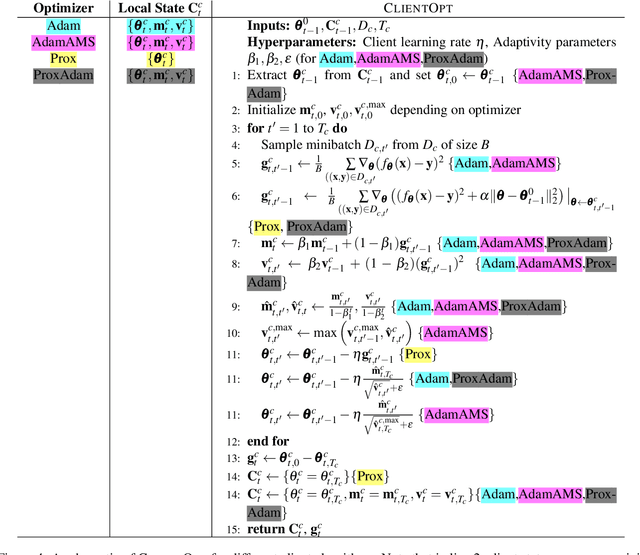
Abstract:The advent of smart meters has enabled pervasive collection of energy consumption data for training short-term load forecasting models. In response to privacy concerns, federated learning (FL) has been proposed as a privacy-preserving approach for training, but the quality of trained models degrades as client data becomes heterogeneous. In this paper we propose the use of personalization layers for load forecasting in a general framework called PL-FL. We show that PL-FL outperforms FL and purely local training, while requiring lower communication bandwidth than FL. This is done through extensive simulations on three different datasets from the NREL ComStock repository.
Privacy-Preserving Load Forecasting via Personalized Model Obfuscation
Nov 21, 2023Abstract:The widespread adoption of smart meters provides access to detailed and localized load consumption data, suitable for training building-level load forecasting models. To mitigate privacy concerns stemming from model-induced data leakage, federated learning (FL) has been proposed. This paper addresses the performance challenges of short-term load forecasting models trained with FL on heterogeneous data, emphasizing privacy preservation through model obfuscation. Our proposed algorithm, Privacy Preserving Federated Learning (PPFL), incorporates personalization layers for localized training at each smart meter. Additionally, we employ a differentially private mechanism to safeguard against data leakage from shared layers. Simulations on the NREL ComStock dataset corroborate the effectiveness of our approach.
Federated Short-Term Load Forecasting with Personalization Layers for Heterogeneous Clients
Sep 22, 2023Abstract:The advent of smart meters has enabled pervasive collection of energy consumption data for training short-term load forecasting (STLF) models. In response to privacy concerns, federated learning (FL) has been proposed as a privacy-preserving approach for training, but the quality of trained models degrades as client data becomes heterogeneous. In this paper we alleviate this drawback using personalization layers, wherein certain layers of an STLF model in an FL framework are trained exclusively on the clients' own data. To that end, we propose a personalized FL algorithm (PL-FL) enabling FL to handle personalization layers. The PL-FL algorithm is implemented by using the Argonne Privacy-Preserving Federated Learning package. We test the forecast performance of models trained on the NREL ComStock dataset, which contains heterogeneous energy consumption data of multiple commercial buildings. Superior performance of models trained with PL-FL demonstrates that personalization layers enable classical FL algorithms to handle clients with heterogeneous data.
Unsupervised Deep Learning for AC Optimal Power Flow via Lagrangian Duality
Dec 07, 2022
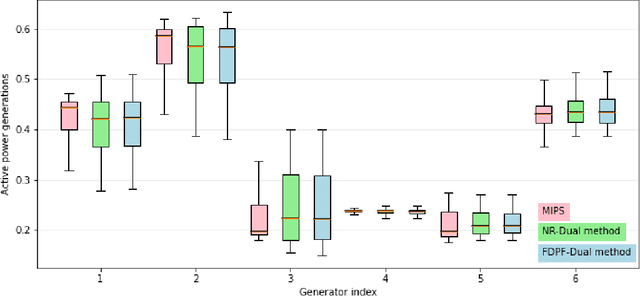
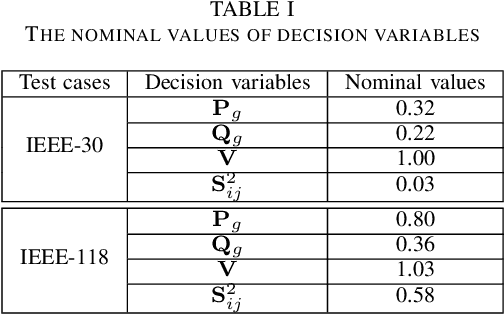
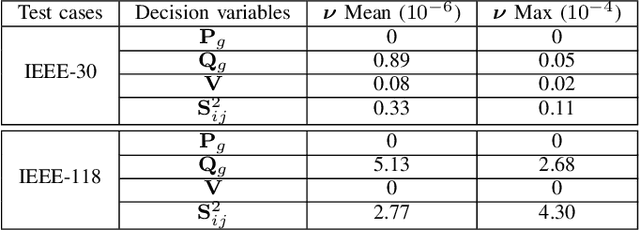
Abstract:Non-convex AC optimal power flow (AC-OPF) is a fundamental optimization problem in power system analysis. The computational complexity of conventional solvers is typically high and not suitable for large-scale networks in real-time operation. Hence, deep learning based approaches have gained intensive attention to conduct the time-consuming training process offline. Supervised learning methods may yield a feasible AC-OPF solution with a small optimality gap. However, they often need conventional solvers to generate the training dataset. This paper proposes an end-to-end unsupervised learning based framework for AC-OPF. We develop a deep neural network to output a partial set of decision variables while the remaining variables are recovered by solving AC power flow equations. The fast decoupled power flow solver is adopted to further reduce the computational time. In addition, we propose using a modified augmented Lagrangian function as the training loss. The multipliers are adjusted dynamically based on the degree of constraint violation. Extensive numerical test results corroborate the advantages of our proposed approach over some existing methods.
 Add to Chrome
Add to Chrome Add to Firefox
Add to Firefox Add to Edge
Add to Edge